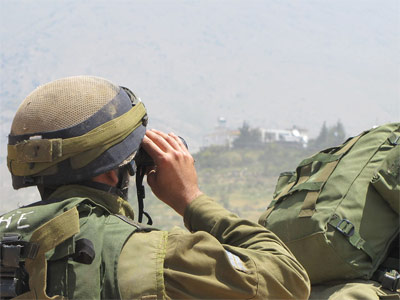Israel's Approach to Syria
Should Jerusalem bid good luck to both sides, or fear a new threat?
 Israel watches the events in Syria closely. In the last weeks there have been several incidents. Though minor, they were on the sensitive border between the two states in the Golan Heights. And this was not the first time such incidents occurred there.
Israel watches the events in Syria closely. In the last weeks there have been several incidents. Though minor, they were on the sensitive border between the two states in the Golan Heights. And this was not the first time such incidents occurred there.
The fall of Assad would probably come together with the collapse of Syria as a state, which would include the disintegrating of her conventional military. For Israel this would be the end of a serious threat—a high intensity war—at least on that front. Syria also has three thousand rockets and missiles, some of which can hit any spot in Israel. Assad would no longer be able to threaten Israel with them. But warlords and other groups that would seize those weapons might use them—including against Israel.
Furthermore, Assad supports Hezbollah and Iran, two of Israel’s sworn enemies. Without Assad, Hezbollah would be both isolated and exposed. Following the assistance Hezbollah gave to Assad, radical Sunni rebels in Syria might wish to return the favor after they finished with Assad. For Israel a fight between two anti-Israeli groups, Sunni radicals from Syria and Hezbollah, would be a smaller version of the Iran-Iraq war in the 1980s: two of her foes bash each other while leaving her alone.
Some Israelis already take a similar perspective on the ongoing clash in Syria. On Israeli websites, it is common to find cynical reader comments attached to articles on the war in Syria: “good luck for both sides.” For Israel a war between Syrian Sunni radicals and Hezbollah is a kind of win-win situation—although there could be negative ramifications for Israel as well. Sparks from a brawl in Lebanon between Hezbollah and Syrians could hurt Israel too. Either way, the latter should not try to ignite such a collision. Israel also needs to avoid intervening in the Syrian quagmire.
For Israel there are other possible downsides if (or actually when) Assad becomes the former president of Syria. Since the end of the attrition war that followed the 1973 Yom Kippur war, there was quiet in the Golan Heights for almost forty years. In the Middle East this is like an eternity for a period without war, particularly in an area that has been a battlefield more than once. But now there could be infiltrations from Syria into the Golan Heights, as in the late 1960s. No wonder the IDF is building a sophisticated fence in the Heights as part of the preparations for the day after Assad. For Israel the Syrian border might turn out to be like the one Israel has with the Gaza Strip—a front where Israel would have an ongoing low-intensity war.
Israel is also worried about Syria’s unconventional arsenal. In 2007 the Israeli Air Force destroyed Syria’s ability to produce a nuclear weapon. Now Israel is facing another unconventional challenge in Syria, not as severe as an atomic bomb but much more urgent. Syria’s chemical weapons, which are already in the wrong hands, those of Assad, might be captured by Hezbollah, which has men inside Syria. Their mission is to help Assad and to seize advanced assets such as chemical weapons. If Syria collapses, Hezbollah would lose a vital ally. But in the same time the Lebanese group could gain a lethal weapon. Syria as a state would be no more. But the radical Shiite nonstate organization would become stronger. Another problem for Israel is that Syrian long-range surface-to-surface, antiaircraft, and antitank missiles might fall into Hezbollah’s hands, or those of other dangerous groups. They might have problems in operating such advanced weapons, but they could learn how to use them.
Meanwhile Israel could not do much about a collapsed Syria. The Israelis would continue to observe the situation in Syria and at most consider another air strike along the lines of the bombardment that was carried out in January 2013. The mission then was to prevent the delivery of advanced weapons to Hezbollah.
As long as the brutal struggle inside Syria between different enemies of Israel does not bother the latter too much, it is the lesser of two evils. Yet eventually the risk of high-intensity war in the Golan (which could have been devastating for both sides, but never happened) could be replaced with low-intensity war. Overall there would be less danger for Israel. But her north, particularly the Golan Heights, would face tough times.
Ehud Eilam (Ph.D) represents IsraelDefense magazine in the USA. He is a former private contractor for the Israeli ministry of defense, and served as an academic instructor at the IDF's Staff and Command College.
Image: Flickr/Israel Defense Forces. CC BY-NC 2.0.
